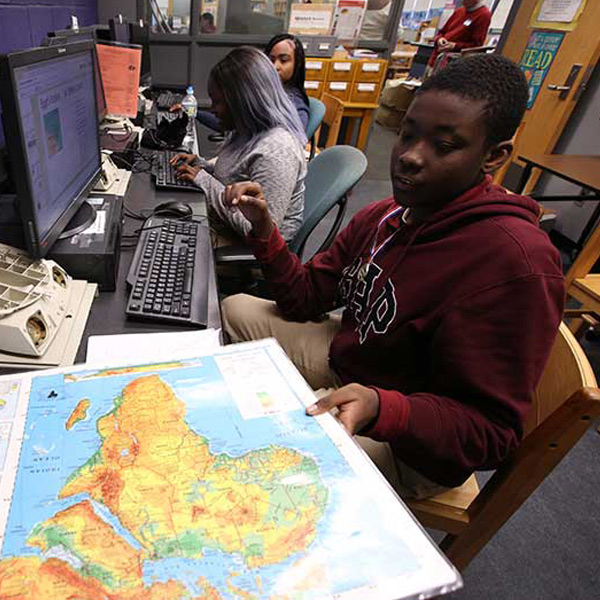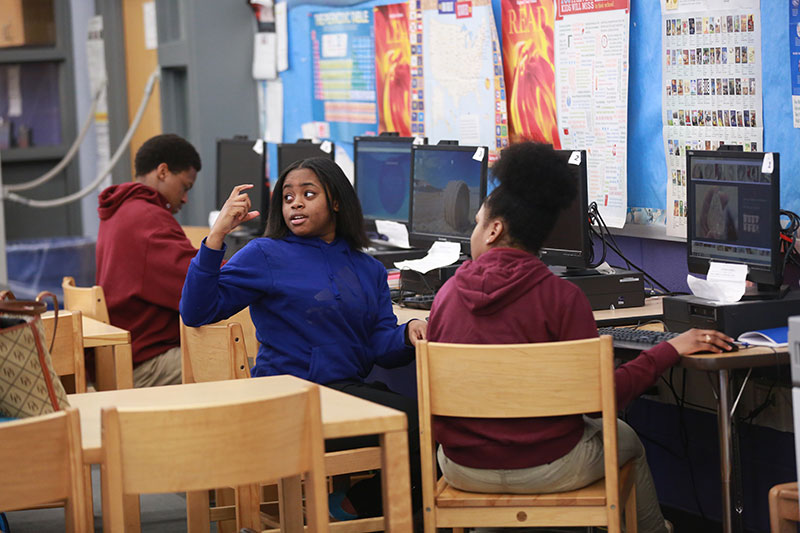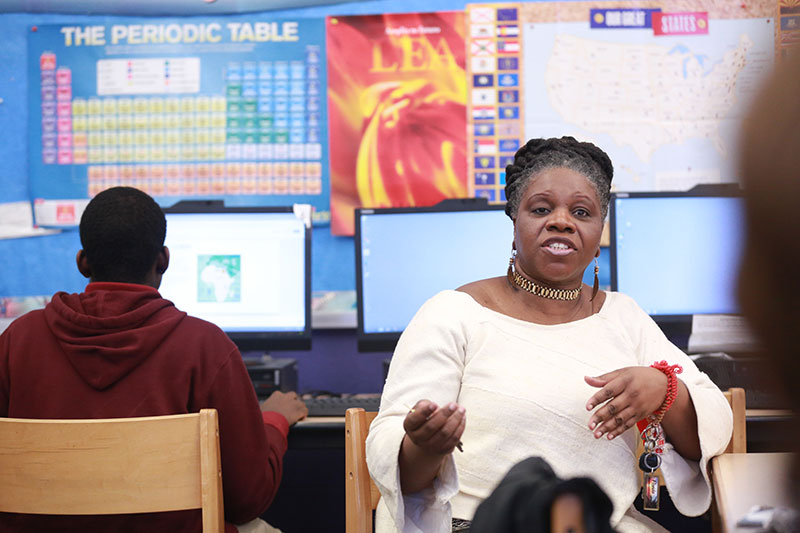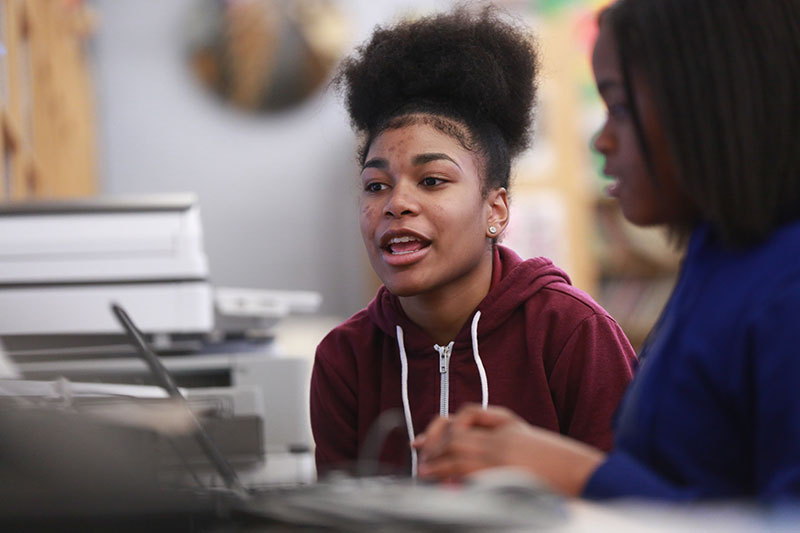An advanced placement seminar on the African Diaspora, developed at TC, is piloting in New York City and Huntsville, Alabama
Tabloid talk shows don’t get much air time in high school advanced placement courses. But this past fall, a segment on “Martina Big,” a white woman who transformed herself to a person of color via plastic surgery, a hair weave, skin darkener and altered speech, tapped deep feelings among sophomores in The African Diaspora, an AP class at Medgar Evers Preparatory High School in Brooklyn.
“I don’t think she knows what black is,” said an outraged Kayla Sergeant. “She thinks it’s all about skin and hair. She doesn’t know that being black is being afraid of what will happen if a police officer stops you while you’re walking down the street.”
“She’s mocking our culture and our race,” said Romeline Moreau, dissolving in tears.

PUTTING IT ON THE MAP “Diaspora” isn’t in many students’ vocabularies, so the new course is creating an awareness of cultures that have shaped the global community.
Piloting this academic year in high schools in Brooklyn and Alabama, The African Diaspora is devoted to the forced dispersal of African people worldwide, who, taken together, would constitute the world’s third most populous country.
[ Read about a fundraiser for the African Diaspora Consortium that will be held at Jazz at Lincoln Center on April 14th, co-hosted by Teachers College and featuring performance and conversation by several members of the Marsalis family. ]
The course – developed in significant part at Teachers College’s Institute for Urban & Minority Education (IUME) under the co-leadership of then- faculty member Ernest Morrell, Chair of the ADC Advisory Committee (and now Coyle Professor in Literacy Education at the University of Notre Dame), and Patrick Manning, Andrew W. Mellon Professor of World History at the University of Pittsburgh – is the first devoted exclusively to a part of global history for the most part obscured by the Euro-centric view of the world found in most textbooks.
“There is very little mention of the Diaspora in American history, sociology and geography. A lot of students don’t even know what the word means.”
— Dale Fleury
“There is very little mention of the Diaspora in American history, sociology and geography,” says Dale Fleury, Program Director for “A-Plus College Ready,” the organization that led the effort to introduce the Diaspora course to students at the Virgil Grissom High School in Huntsville. “A lot of students don’t even know what the word means. They might get a few lessons on the Jewish Diaspora and the Holocaust, but that’s about it. There just isn’t a lot out there about other cultures that shaped the global community.”
“There are many AP history courses,” says Kassie Freeman, Founding President and CEO of the African Diaspora Consortium (ADC). Freeman is also a IUME Fellow and special advisor to TC Provost and Dean Thomas James. “But we wanted a course that asks a different set of questions about the dispersal of African descendants and how they oriented to a new world after they were dispersed. Most people have no idea about the diaspora. But when you’re in a global environment it is very important to understand so many shared experiences and lessons.”
“Certainly there are courses in black and African-American studies that reference the arts, food, culture and music. But what really distinguishes this effort is that it treats the student as a scholar who is able to seek and use information and evidence on each and all of the subjects that constitute the AP course.”
— Henry M. Levin

TREATING STUDENTS AS SCHOLARS Other courses reference African-American arts, food, music and culture. This one challenges students to seek and use information.
Originally the brainchild of ADC board member Michael Nettles, Senior Vice President of Educational Testing Service, The African Diaspora matches traditional instruction and Socratic learning with independent research culminating in a written project. Beginning in the 1400s and moving to the present, with a focus on communities in the Americas, Africa and Eurasia, the course touches upon common experiences across the diaspora such as imperialism, resistance to oppression and cultural practices.
“It’s a rich, rich course” that encourages students to engage in “an inner dialogue with themselves,” says TC’s Henry Levin, William H. Kilpatrick Professor of Economics and Education, who serves as Vice Chair of the ADC Planning and Advisory Committee and a member of ADC’s Board. “Certainly there are courses in black and African-American studies that reference the arts, food, culture and music. But what really distinguishes this effort is that it treats the student as a scholar who is able to seek and use information and evidence on each and all of the subjects that constitute the AP course.”
“This class helps you learn about stuff you don’t see in textbooks,” says Medgar Evers 10th grader Yeilys Infante. “In global history you talk about the whole world, but you don’t really talk about African history. It’s kind of glazed over, white-washed so you don’t really know it from a black person’s point of view.”
“I wanted them to see Africa as they’ve never seen it before. An Africa that is beautiful and an Africa that is rich. They’ve never heard those two words used to describe Africa. They’ve only heard of Africa in terms of poverty and disease and violence.”
— Marcia Stuart
“It fills a huge gap,” says Marcia Stuart, Assistant Principal at Medgar Evers, who introduced the course in September with a primer on ancient African kingdoms and customs. “I wanted them to see Africa as they’ve never seen it before. An Africa that is beautiful and an Africa that is rich. They’ve never heard those two words used to describe Africa. They’ve only heard of Africa in terms of poverty and disease and violence.”
That perspective has exposed the students to music, dance, cuisine, customs and other foundational chapters in the black experience, both in Africa and worldwide.
“The textbooks usually just teach us about slavery, how it was abolished and how African Americans fought for freedom,” says Sergeant. “In this class we learn about what African Americans went through and how it leads to society today.”
The continuum from past to present, and the commonalties of black experiences and culture around the world, were part of what gave Freeman the first glimmerings of an idea for the ADC decades ago when she arrived on the campus of Norway’s University of Oslo to find people who looked like her.
“I’d had no idea,” says Freeman, who grew up in rural Alabama.
Subsequent travels across Europe further dispelled Freeman’s belief that America had been the sole destination of men, women and children misappropriated from the African continent.
“There were similarities across all countries going back to the historical dispersal,” she says.
The parallels stayed with Freeman as she progressed through leadership posts at Bowdoin College, the Southern University System and Dillard University and a presidential appointment to the Board of Advisors on Historically Black Colleges and Universities.
“It took a long time, but in the back of my mind I always thought there must be a way for us to address international issues collectively through the shared knowledge of dispersed people.”
— Kassie Freeman
“It took a long time, but in the back of my mind I always thought there must be a way for us to address international issues collectively through the shared knowledge of dispersed people,” she says.
In 2014, Freeman acted on that inclination, forming ADC, a non-profit dedicated to researching and providing opportunities to educate young people about the historic, economic and artistic cultures that fragmented, survived and took root anew after a millions of black Africans were forced aboard slave ships bound for Europe and the Americas between the 16th and 19th centuries
Levin was among the first scholars to join a cause that has since recruited former Bermuda Premier Paula Cox, British MP David Lammy as a supporter, and trombonist Delfeayo Marsalis, whose participation accentuates the program’s emphasis on the relationship between the Diaspora and the arts.
Levin views African Diaspora studies as an opportunity to increase enrollment by young people of color in advanced placement courses and reassure them that they indeed have a “place in the educational panorama.”
That clearly seems to be happening at Medgar Evers in Brooklyn, where every Medgar Evers student is of African or Caribbean descent. Stuart, the assistant principal, says the course reminds students “take what they are learning here and apply it to their own lives and situations.”
Stuart, who says she is indulging her passion for classroom teaching, brings personal perspective to the course – that of a Guyana native who as a six-year-old emigrated with her family to the U.S. from a nation also populated by descendants of the slave trade connecting Africa to South America.

SEARCHING FOR HERITAGE At Medgar Evers in Brooklyn, where all the students are of African or Caribbean descent, Stuart says the focus is on applying knowledge from the course on a personal level.
“I look for African heritage whenever I go back,” she says.
And Michael Wiltshire (Ph.D. ’94), Medgar Evers’ Principal and a TC alumnus, views the Diaspora class as a cornerstone of the school’s commitment to “exposing our students to the richness of African history and heritage.”
Sophomore Thalias Henry, for one, says he is now able to draw a direct line from the African continent to “events in the real world” such as Ferguson and Black Lives Matter. And Kayla Sergeant likewise appreciates how a “special food that you’re cooking is connected to a specific tribe or a specific people and why it was significant to them.”
But the content of the AP African Diaspora Capstone Seminar seems to hold equal appeal for a group of white and Asian students taught by Cary Hurt at Virgil Grissom High, Alabama’s fourth largest high school.
“It has broadened how they view the local and world problem of civil rights,” says Hurt. “They’ve boiled it down to how the core issues of the past determine and form the current standing of race relations and what can be done about it.”
Like Freeman arriving in Norway long ago, the Grissom students were intrigued by the global scope of the slave trade – so much so that classroom discussion has touched on the influence of the Diaspora on Brazilian culture, the Middle East and international cuisine.
“They really embraced the topic,” says Hurt. “They went in a lot of different directions.”

EMBRACING THE TOPIC The African Diaspora is "a formal course that serves as a basis for students to do what they want with it."
Which is precisely the point, says Manning, an expert on the Diaspora and former president of the American Historical Association. “It sits with what the design crew hoped would happen.” He adds that self-realization and awareness were key objectives of the development team. “It is a formal course that serves as a basis for students to do whatever they want with it.”
Freeman concurs. “We allow flexibility in terms of the way they connect and engage with the materials. It allows them to grow,” she said. “At the same time, the end point of the multiple perspectives is to help them improve their inquiry, exploration, research, writing and presentation skills.”
The students’ response in Brooklyn and Huntsville comes as no surprise to Rhonesha Blache, a TC doctoral student monitoring the Medgar Evers class.
A former and future teacher who has traveled extensively to under-served nations, Blache understands as well as anyone how a visit to South America or Africa can simultaneously stir the emotions and inspire intellectual inquiry.
“It is a healing process,” she says. “We unpack a little bit more each time.”
Levin, for his part, views the AP African Diaspora curriculum through an equally long lens.
“They don’t know it yet,” he says, “but someday these kids will be teaching this course.” – Steve Giegerich